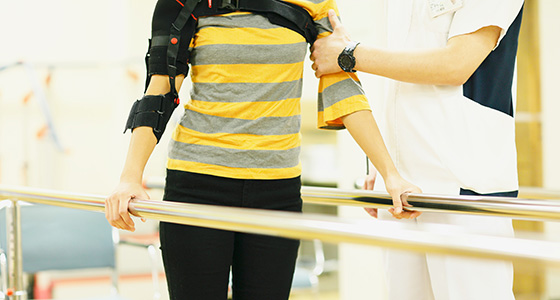- HOME
- Department
- Rehabilitation
Rehabilitation

1.Overview
The Rehabilitation department provides rehabilitation to those patients who are inpatients by working closely with other departments. We work with departments such as Neurosurgery, Neurology, and Orthopedic Surgery where rehabilitation is an essential part of treatment but also with many other departments such as Dermatology and Palliative Care. We have provided rehabilitation services to more than 3,000 patients annually* since 2014.
Our department manages diseases and injuries often causing wide range of motor and neurological functions. We have also been treating increasing number of patients who develop disuse syndrome (prolonged inactivity such as when during admission to hospital, leading to the loss of the body’s motor and psychological functions)
- *5,355 new patients total from April 1, 2024 to March 31, 2025.
2.Policy
Our primary aim is to improve our patients’ quality of life by having our patients at the center of the team and working closely with the multidisciplinary teams. We also value close collaboration with nurses from all the departments and inpatient wards.
We set up a rehab plan for each patient by actively sharing information among the team and tailoring rehabilitation depending on the nature of the disease.
3.Our Strengths
We Commence Your Rehabilitation Program for Stroke Patients from Day 1
At our department, we work in collaboration with our Stroke Care Unit, which was established in 2005, to ensure that stroke patients can begin rehabilitation from the day of their hospital admission. Rehabilitation, including swallowing therapy, is initiated on the day of admission or the following day. This early intervention aims to promote early mobilization and functional recovery. As a result, the average length of hospital stays at our Stroke Care Unit for the year 2024* was approximately 16.3 days.
- *April 1, 2024 – March 31, 2025
Our Approach to Patients with Disuse Syndrome
Disuse syndrome is a condition that can adversely affect the activities of daily living, caused by prolonged immobilization leading to muscle weakness, decline in body organ functions and joint contractures. Disuse syndrome is increasingly becoming more common, especially among the ageing society.
Prevention of disuse syndrome by intervening at an early stage is important for minimizing the effect of disuse syndrome post-discharge. We therefore start rehabilitation as early as possible by proactively finding patients who are experiencing difficulties in eating and doing physical activities during their hospital stay and constantly sharing information about patients with our nursing staff.
We Value Teamwork with Other Departments
We provide rehabilitation to patients prior to undergoing surgeries for patients with wear-and-tear of bones/joint and other sport related injuries by closely collaborating with our Orthopedic teams. The aim is to improve motor function and maintain muscle mass by commencing rehabilitation prior to the surgery, and therefore improve the outcome of the treatment.
We also work with our pain management team by offering rehabilitation program to improve the range of motion for patients by gradually adjusting the level of motion to the level of pain for each patient. We provide rehabilitation programs to improve the quality of life for patients.
Message for Our Patients
The duration of treatment we could offer through rehabilitation is often limited by the time available, given our function as an acute care hospital. With this limitation in mind, we aim to provide satisfactory rehabilitation programs at the early/acute stage of diseases.
We are dedicating ourselves to supporting patients and their families to return to the life of normality and overcoming some of the challenges together with our patients. We are always closely collaborating with nearby rehabilitation hospitals and other rehabilitation services.
From Director Akira Fukuda
Related links:
[ Department of Rehabilitation Medicine ]